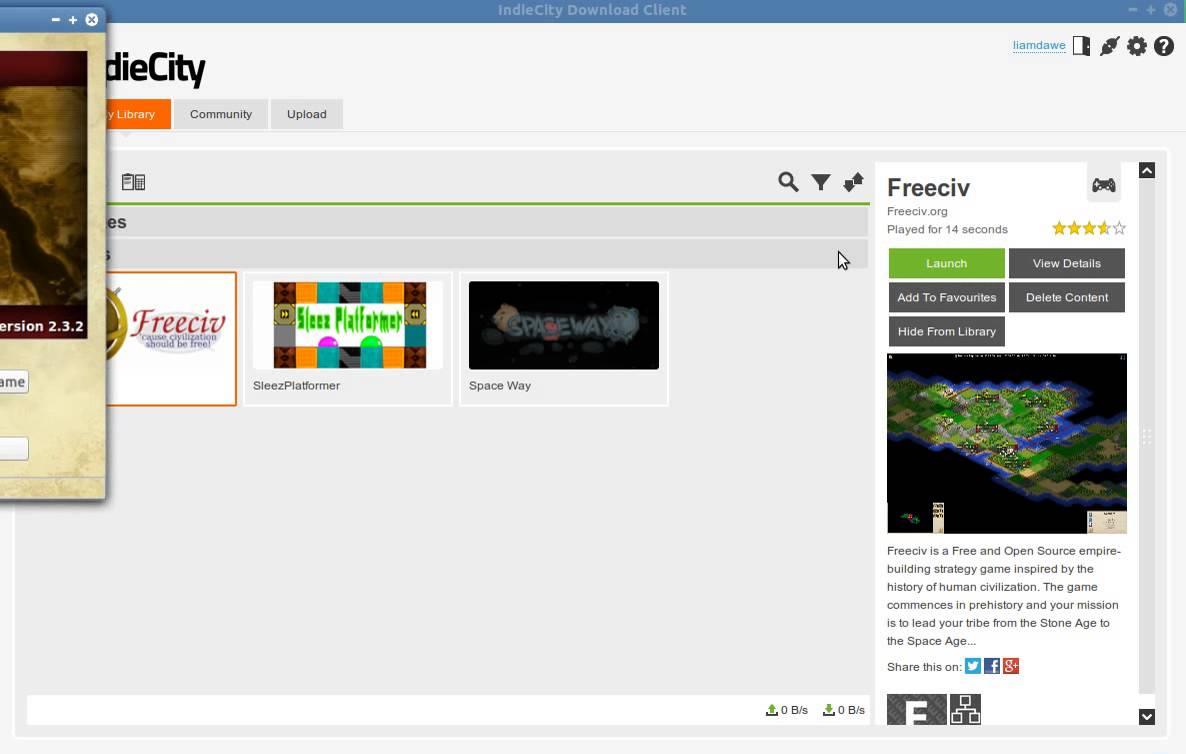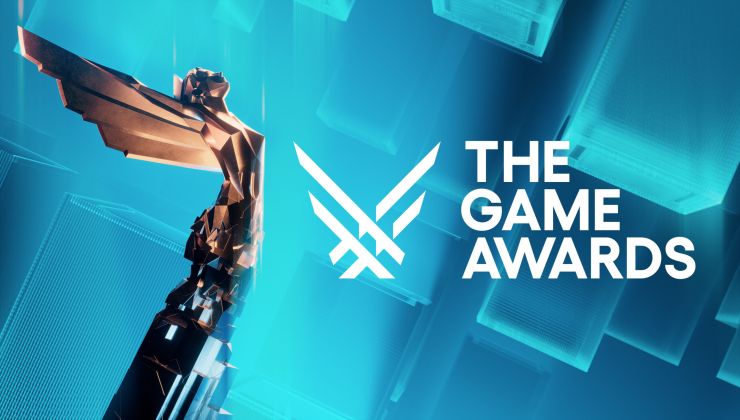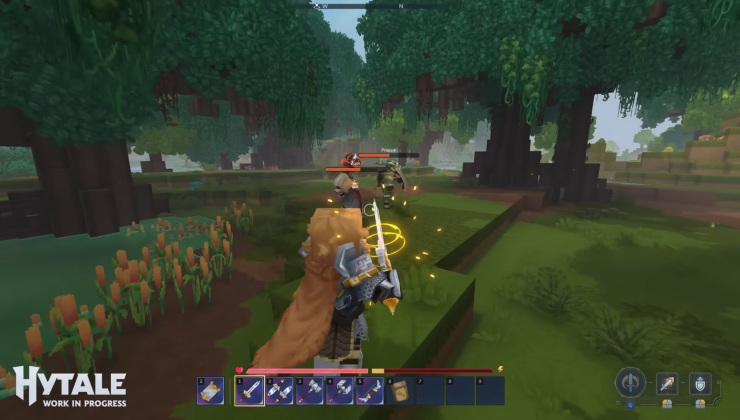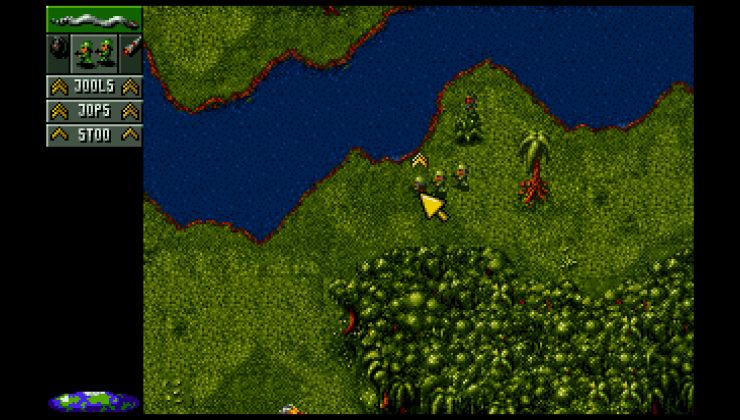Todays GamingOnLinux.com question time is all about IndieCity and their soon to arrive Linux client, this means alongside Steam and Desura we will have another client on Linux.
First of all can you introduce yourself and IndieCity?
Well, I’m Hannah Fordham and I’m a Community Manager for IndieCity, which is essentially a marketplace for indie creators to sell their downloadable stuff. We started out as a site for indie games, but we’ve since expanded (partially because of opening the Pi Store) to include all indie software, tutorials, assets, books, and anything else you can think of that people can download!
What makes it different to similar services like Steam and Desura?
From the moment we started IndieCity we’ve always been set on having no gatekeepers, so any indie games could get onto IndieCity regardless of whether the staff here happened to enjoy them or not. We want to be a marketplace on which any indie developer with any amount of experience, budget, size of team, etc. can release their projects.
Developers can release their content as “in progress” with no approval system at all, or they can put it through to the store as “complete” by going through our Community Approval Process (CAP). CAP testers just check that the content is packaged correctly, that it runs and is stable during their testing, and that it matches whatever the store page for it says (this is especially important for content descriptors and age ratings so that people are aware of what they are buying).
So on IndieCity a developer can register and have a game 100% guaranteed to be accepted to be sold if they mark it as "in progress"?
Yep, although people can file reports of inappropriate content (similar to the way YouTube and other sites that rely on user content work) so although anything can be put up for sale if marked as “in progress”, if it is illegal (for example if it is someone else’s game that has been uploaded) or inappropriate for some other reason (as deemed by the community) then don’t expect it to last long!
What influenced you decision to bring the client over to Linux?
We’ve always wanted to bring IndieCity to other platforms (as part of becoming a site where any developer can sell their projects), but we use a client in order that we can support free games, so it required that we dedicate a lot of time to porting the client which had previously been Windows-only. However, last year we launched the Pi Store with the Raspberry Pi Foundation which meant that we did a lot of the work towards putting the client on Linux which could then be used to speed up the process considerably.
We’re really excited about opening up IndieCity to Linux and are looking forward to seeing Linux versions of games currently released on IndieCity, Linux-only games, and new games that have Linux and Windows versions coming onto the site!
You said you launched the Pi Store, so you guys actually run the official store for the Raspberry Pi as well?
Yes! We launched the store with the Raspberry Pi Foundation in December last year and continue to run the website and client side of things (content on the Pi Store goes through a more strict approval process because of its focus on school children, which is administrated by the Raspberry Pi Foundation).
Have you spoken to many of your current developer base about publishing Linux builds of games?
When we first asked for Linux testers we had a few of our current developers sign up and they have uploaded builds of their games for testing. At the moment we’ve not contacted our wider developer community but once we’ve finalised the Linux build we’ll spend time working with them to get their games onto Linux so they’re available to more people. A lot of our developers use tools like Unity3D which should make it relatively easy to create Linux builds of their games.
Hannah also let us know how developers can package their games.
Freeciv just runs apt-get but developers can also upload executables directly, and have the option to upload an install script (which is where the apt-get install command would be for that Freeciv installation).
How do you plan on making it easy for Linux gamers to find Linux games on your service since currently it has no platform filtering options?
We have the ability to filter based on platforms in place already on the site, it’s just currently hidden but will be unhidden when we release the Linux client so people should find it easy to view games by platform.
Does the client itself need to be open to run games purchased on IndieCity?
IndieCity has a set of features called IndieCity Extras (ICELib) which includes authentication, leaderboards, and achievements. For this to work games need to be run through the client, however the Linux version of ICELib won’t be out until after the client is released. Until ICELib for Linux is available no developers will be able to use these features and so the games won’t need the client to be open to be run.
Any sort of ETA for the extras?
I'm afraid not at the moment, I’ll keep you updated though as we’re having a large planning meeting early next week so I might get more of an idea then.
Anything you would like to end it on to say to the Linux community?
Just that I’m really happy we’re finally launching on Linux and I’m looking forward to meeting a whole bunch of new people from the Linux community who have until now been shut out of IndieCity. I’m really happy we’ve got your support and I hope we live up to the expectations!
The Linux client will by default show Linux-only content, it’s only showing Windows stuff at the moment because IndieCity for Linux is still in testing rather than publicly available.
Here is a very quick video just walking you through the client and showing it installing and uninstalling freeciv:

Hope you enjoy the interview and short video, thank you to Hannah and the IndieCity team for their Linux work (especially for the awesome Raspberry Pi too!).
First of all can you introduce yourself and IndieCity?
Well, I’m Hannah Fordham and I’m a Community Manager for IndieCity, which is essentially a marketplace for indie creators to sell their downloadable stuff. We started out as a site for indie games, but we’ve since expanded (partially because of opening the Pi Store) to include all indie software, tutorials, assets, books, and anything else you can think of that people can download!
What makes it different to similar services like Steam and Desura?
From the moment we started IndieCity we’ve always been set on having no gatekeepers, so any indie games could get onto IndieCity regardless of whether the staff here happened to enjoy them or not. We want to be a marketplace on which any indie developer with any amount of experience, budget, size of team, etc. can release their projects.
Developers can release their content as “in progress” with no approval system at all, or they can put it through to the store as “complete” by going through our Community Approval Process (CAP). CAP testers just check that the content is packaged correctly, that it runs and is stable during their testing, and that it matches whatever the store page for it says (this is especially important for content descriptors and age ratings so that people are aware of what they are buying).
So on IndieCity a developer can register and have a game 100% guaranteed to be accepted to be sold if they mark it as "in progress"?
Yep, although people can file reports of inappropriate content (similar to the way YouTube and other sites that rely on user content work) so although anything can be put up for sale if marked as “in progress”, if it is illegal (for example if it is someone else’s game that has been uploaded) or inappropriate for some other reason (as deemed by the community) then don’t expect it to last long!
What influenced you decision to bring the client over to Linux?
We’ve always wanted to bring IndieCity to other platforms (as part of becoming a site where any developer can sell their projects), but we use a client in order that we can support free games, so it required that we dedicate a lot of time to porting the client which had previously been Windows-only. However, last year we launched the Pi Store with the Raspberry Pi Foundation which meant that we did a lot of the work towards putting the client on Linux which could then be used to speed up the process considerably.
We’re really excited about opening up IndieCity to Linux and are looking forward to seeing Linux versions of games currently released on IndieCity, Linux-only games, and new games that have Linux and Windows versions coming onto the site!
You said you launched the Pi Store, so you guys actually run the official store for the Raspberry Pi as well?
Yes! We launched the store with the Raspberry Pi Foundation in December last year and continue to run the website and client side of things (content on the Pi Store goes through a more strict approval process because of its focus on school children, which is administrated by the Raspberry Pi Foundation).
Have you spoken to many of your current developer base about publishing Linux builds of games?
When we first asked for Linux testers we had a few of our current developers sign up and they have uploaded builds of their games for testing. At the moment we’ve not contacted our wider developer community but once we’ve finalised the Linux build we’ll spend time working with them to get their games onto Linux so they’re available to more people. A lot of our developers use tools like Unity3D which should make it relatively easy to create Linux builds of their games.
Hannah also let us know how developers can package their games.
Freeciv just runs apt-get but developers can also upload executables directly, and have the option to upload an install script (which is where the apt-get install command would be for that Freeciv installation).
How do you plan on making it easy for Linux gamers to find Linux games on your service since currently it has no platform filtering options?
We have the ability to filter based on platforms in place already on the site, it’s just currently hidden but will be unhidden when we release the Linux client so people should find it easy to view games by platform.
Does the client itself need to be open to run games purchased on IndieCity?
IndieCity has a set of features called IndieCity Extras (ICELib) which includes authentication, leaderboards, and achievements. For this to work games need to be run through the client, however the Linux version of ICELib won’t be out until after the client is released. Until ICELib for Linux is available no developers will be able to use these features and so the games won’t need the client to be open to be run.
Any sort of ETA for the extras?
I'm afraid not at the moment, I’ll keep you updated though as we’re having a large planning meeting early next week so I might get more of an idea then.
Anything you would like to end it on to say to the Linux community?
Just that I’m really happy we’re finally launching on Linux and I’m looking forward to meeting a whole bunch of new people from the Linux community who have until now been shut out of IndieCity. I’m really happy we’ve got your support and I hope we live up to the expectations!
The Linux client will by default show Linux-only content, it’s only showing Windows stuff at the moment because IndieCity for Linux is still in testing rather than publicly available.
Here is a very quick video just walking you through the client and showing it installing and uninstalling freeciv:

YouTube videos require cookies, you must accept their cookies to view. View cookie preferences.
Direct Link
Direct Link
Hope you enjoy the interview and short video, thank you to Hannah and the IndieCity team for their Linux work (especially for the awesome Raspberry Pi too!).
Some you may have missed, popular articles from the last month:
All posts need to follow our rules. Please hit the Report Flag icon on any post that breaks the rules or contains illegal / harmful content. Readers can also email us for any issues or concerns.
Great move IndieCity. Definitely I will look into publishing on this platform now. My game also runs on R-Pi so maybe I can do two birds with one stone :D
0 Likes
Hey guys, just wanted to say that I'll be keeping an eye on this so if anyone has any other questions feel free to ask in the comments and I'll do my best to answer! :)
0 Likes
Hi Hannah is there anywherewe can check the progress on the Linux Client and maybe see a release date etc when available?
0 Likes
I'm afraid at the moment it's still a couple of weeks away for gamers. We have the majority of the client and site set up ready and so I'm hoping to start contacting our current devs next week and also push out more details for other developers who want to get their stuff onto the site. We'll give people a week or so to get their stuff sorted before properly releasing to gamers. :)
0 Likes
Thankyou so much for your time and info :D
0 Likes
Hi Hannah, I'm wondering if you could do so that the games using the extra features could actually be launched without the client (the extra features would be disabled in-game) ? This way I wouldn't be forced to use the client if the only thing I want to use IndieCity for is buying and installing the games.
0 Likes
At the moment that isn't possible, but it's something we'dwant to look at to try and make IndieCity easier and more flexible to use. I'm afraid I can't quite remember why (I think it's to do with the method by which authenticaton tokens etc. have to be acquired at the moment), but I can find out more next week to see how feasible that would be. :)
0 Likes
Ok, that's great to know that you're open to the idea. :) I'm looking forward to more news regarding this!
0 Likes
I agree that would be an important feature a lot of Linux gamers would want
0 Likes
"Linux-only games" Oh how I wish there were some, good ones too, that would give more incentive for more people to switch. Anyway, I'll be keeping an eye out for this and I'm sure I speak for all when I say: Welcome to the community!. =)
0 Likes
Quoting: Mike Frett"Linux-only games" Oh how I wish there were some, good ones too, that would give more incentive for more people to switch. Anyway, I'll be keeping an eye out for this and I'm sure I speak for all when I say: Welcome to the community!. =)Thanks! Glad to be here! ^_^
0 Likes






 How to setup OpenMW for modern Morrowind on Linux / SteamOS and Steam Deck
How to setup OpenMW for modern Morrowind on Linux / SteamOS and Steam Deck How to install Hollow Knight: Silksong mods on Linux, SteamOS and Steam Deck
How to install Hollow Knight: Silksong mods on Linux, SteamOS and Steam Deck